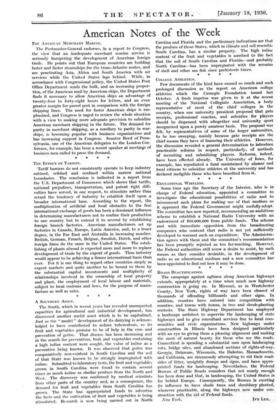THE EFFECT OF TARIFFS.
Tariff barriers do not consistently operate to keep industry cabined, cribbed and confined within narrow national boundaries. The conclusion is indicated in a report from the U.S. Department of Commerce which shows that tariffs, national prejudices, transportation, and patent right diffi- culties have served, in one respect, to stimulate rather than retard the tendency of industry to establish itself upon a broader international base. According to the report, the multiplication of artificial and local obstacles to the free international exchange of goods has been a dominant influence in determining manufacturers not to confine their production to one country but to extend it to several by establishing foreign branch factories. American manufacturers set up factories in Canada, Europe, Latin America, and, to a lesser degree, in the Far East and Australia in increasing number. British, German, French, Belgian, Swedish, Dutch, and other foreign firms do the same in the United States. The estab- lishing of plants abroad is expected more and more to replace development of trade by the export of goods. Thus industry would appear to be achieving a firmer international basis than ever. For it is one thing to regard other countries simply as export markets and quite another to be bound to them by the substantial capital investments and multiplicity of relationships involved in the ownership of local property and plant, the employment of local labour and materials, subject to local customs and laws, for the purpose of manu- facture as well as sales.






































 Previous page
Previous page